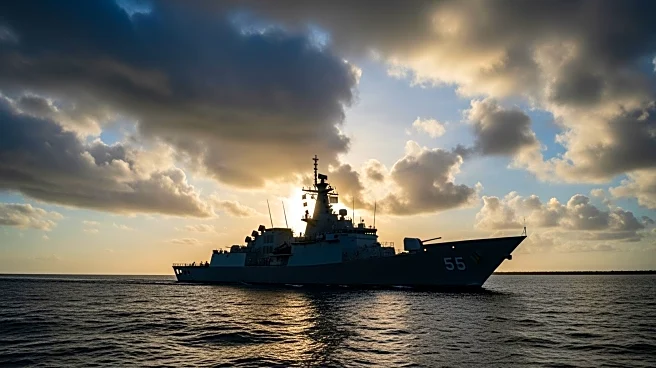What's Happening?
President Trump has initiated a significant military buildup in the Caribbean, which has led to speculation about potential U.S. intervention in Venezuela. The deployment includes the USS Gerald R. Ford, the world's largest aircraft carrier, as part of
a counter-narcotics operation targeting naval vessels. This move is reminiscent of historical U.S. interventions in Latin America, raising concerns among regional governments about the possibility of direct military confrontation. The buildup is seen as unprecedented in scale and intent, potentially damaging U.S. relations with Latin American countries for years to come.
Why It's Important?
The military buildup by the U.S. in the Caribbean could have far-reaching implications for U.S.-Latin American relations. Historically, U.S. interventions in the region have led to significant political and social upheaval. The current situation risks escalating tensions with Venezuela, a country with a large population and military force. If the U.S. proceeds with military action, it could face resistance not only from Venezuela but also from other Latin American nations wary of U.S. interventionism. This could lead to a deterioration of diplomatic relations and increased anti-U.S. sentiment across the hemisphere.
What's Next?
The potential for direct military confrontation with Venezuela remains uncertain. President Trump has walked back suggestions of strikes inside Venezuela, but the presence of U.S. military assets in the region continues to grow. Latin American governments are likely to monitor the situation closely, with some expressing concern over the implications of U.S. actions. The international community may also weigh in, particularly if tensions escalate further. The situation could lead to diplomatic efforts to de-escalate tensions and prevent military conflict.
Beyond the Headlines
The military buildup in the Caribbean highlights broader issues of U.S. foreign policy and interventionism. It raises ethical questions about the use of military force in sovereign nations and the impact on regional stability. The historical context of U.S. interventions in Latin America suggests a pattern of using military power to influence political outcomes, which could have long-term consequences for U.S. relations in the region. The situation also underscores the importance of respecting national sovereignty and the potential backlash against perceived U.S. aggression.















